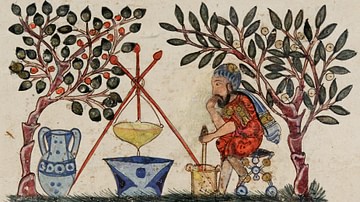Throughout history, ancient civilizations have made remarkable contributions to the field of medicine. Among these pioneering cultures, none can rival the profound impact and enduring legacy left by the people of Mesopotamia. Situated between two great rivers, the Tigris and Euphrates, this cradle of civilization witnessed a flourishing era where medical knowledge thrived.
Ancient Wisdom Unveiled: The Birthplace of Medical Practices
In this land steeped in rich cultural heritage and intellectual curiosity, ancient Mesopotamians laid down the foundations for modern medical practices. Their keen observations and meticulous record-keeping paved the way for groundbreaking discoveries that continue to shape healthcare today.
One notable aspect was their understanding of diseases as natural phenomena rather than supernatural afflictions. By meticulously documenting symptoms and treatments on clay tablets known as “medical texts,” they established an empirical approach towards healing that set them apart from other contemporary societies.
Moreover, these early physicians recognized various bodily systems such as circulation, respiration, digestion, and even identified specific organs like liver or kidneys – a testament to their advanced anatomical knowledge. They also developed surgical techniques like stitching wounds with animal gut sutures or using herbal remedies for pain relief during procedures.
An Elaborate Network: The Role of Temples in Healthcare
In ancient Mesopotamia’s tightly knit society centered around city-states ruled by kings or priests, temples played a pivotal role not only in religious matters but also in healthcare provision. These sacred spaces doubled as centers for medical treatment where patients sought divine intervention alongside practical remedies.
The temple complexes housed skilled healers who were well-versed in diagnosing ailments and prescribing appropriate treatments. These medical practitioners, known as “asipu,” utilized a combination of herbal remedies, rituals, and incantations to heal the sick.
Furthermore, these temples served as repositories for vast libraries containing invaluable medical texts. The knowledge contained within these ancient writings was meticulously preserved and passed down through generations – an early example of organized medical education.
Ancient Mesopotamia’s Enduring Legacy
The contributions made by ancient Mesopotamians in the field of medicine have left an indelible mark on human history. Their emphasis on empirical observation, anatomical understanding, and practical treatment methods laid the groundwork for future advancements in healthcare across civilizations.
Today, we owe much to their pioneering spirit that led to breakthroughs in surgical techniques, pharmacology, and diagnostic practices. By recognizing diseases as natural phenomena with identifiable causes rather than supernatural curses or divine retribution, they set a precedent for evidence-based medicine that continues to guide modern healthcare professionals.
In Conclusion: A Testament to Ancient Ingenuity
The remarkable achievements of ancient Mesopotamian civilization stand as a testament to their ingenuity and intellectual prowess. From their meticulous record-keeping practices to their holistic approach towards healing at temple complexes, they revolutionized the way we understand medicine today.
As we continue our quest for further advancements in healthcare systems worldwide, it is crucial not only to acknowledge but also appreciate the invaluable contributions made by those who came before us – including the brilliant minds of ancient Mesopotamia.


